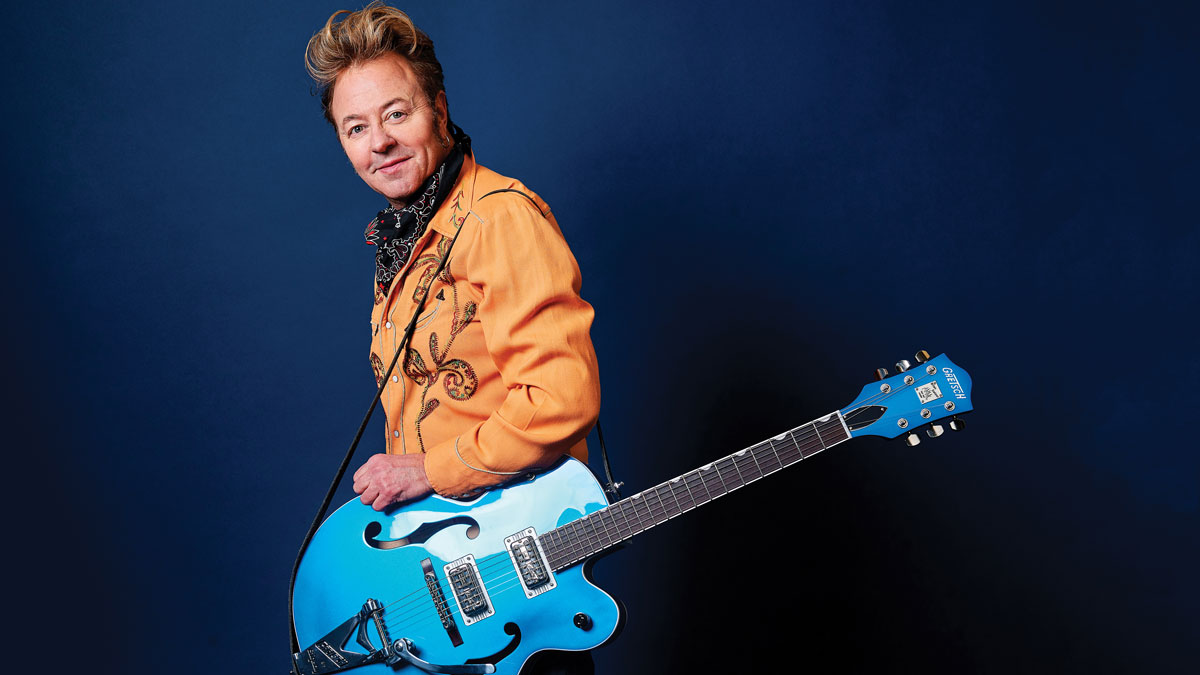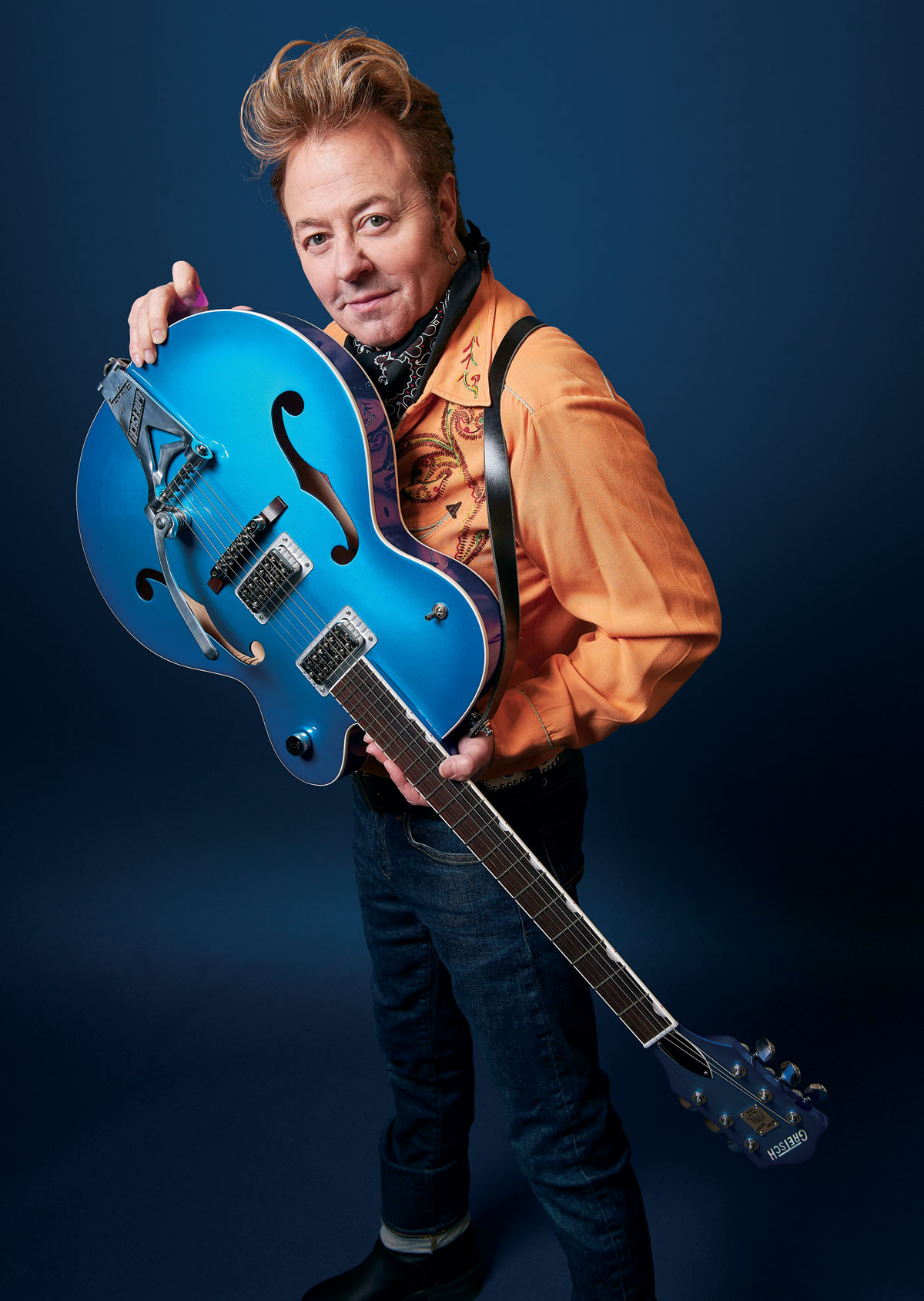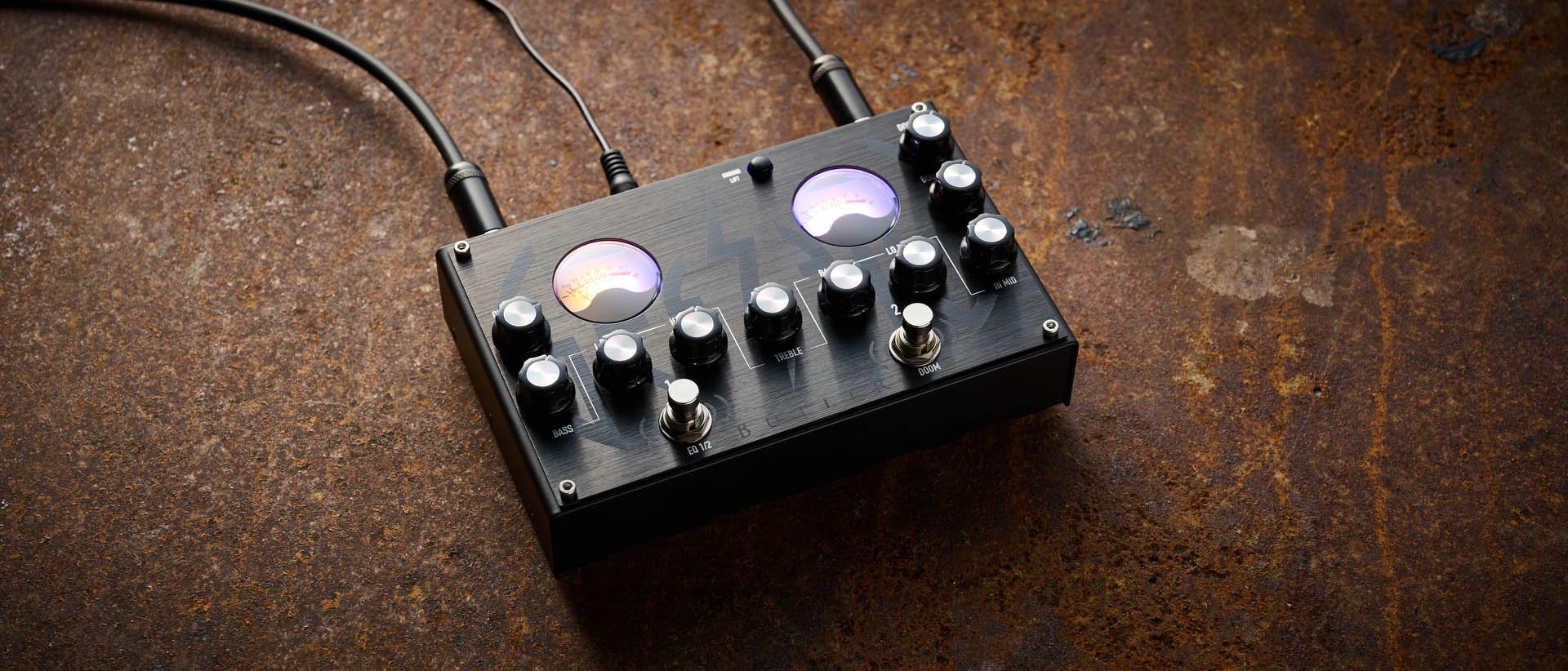“I can play a riff you've probably never heard. If there's a mistake in there, I can work on it. Sometimes the mistakes are the riffs that stick”: Brian Setzer on how he’s kept his writing skills sharp – and the records that define his career
The Gretsch loyalist and rockabilly royal unpicks his latest album, The Devil Always Collects – and discusses his tips for avoiding repetitive riff writing, and why he's finally decided to turn down his amps along the way

Since the earliest days of the Stray Cats, and later with his namesake, Orchestra, Brian Setzer has blazed a trail of his own creation, accompanied by imagery steeped in fast cars, flashy guitars and flaming licks.
It took a certain level of fearlessness to play rockabilly in the early ’80s, let alone have worldwide success, and it took an even greater level of courage to pivot to swing and jive in the ’90s, when grunge and Britpop, propped up by MTV, reigned supreme.
“I don't know if it was fearlessness – or just me being stubborn,” Setzer says. “I'm stubborn enough to refuse to follow along with whatever is going on at the time. I've always been someone who needs to follow his own trail. Trends be damned – I can't follow them. I have to do what I want.
“Rockabilly was ignored before the Stray Cats started, so I feel proud to hold up that crown. We brought it back in a big way and did it the way we wanted. We didn't just cover songs from the ’50s; we wrote our own songs and came up with riffs that wouldn't have been thought of in the ’50s. That's my badge right there; I wear it proudly.”
Setzer’s latest release is a blazing slice of rockabilly called The Devil Always Collects, the satisfying followup to 2021’s Gotta Have the Rumble. Speaking with Guitar World, the Gretsch loyalist opened up about the new record, his creative process and how he stays inspired after all these decades.
Tell me about how The Devil Always Collects got started.
“This album started like most of mine – when I came up with a guitar riff. I came up with the riff for Rock Boys Rock. It was so simple that I was like, 'Hasn't this been done before?' I went back to make sure, and sure enough, it hadn't been done before. It always starts with the riffs, and then the song will build from there.
All the latest guitar news, interviews, lessons, reviews, deals and more, direct to your inbox!
“Then I'll start thinking, 'It would be cool if I shouted, "Rock boys, rock,"' which is pretty catchy. So that's how this record started, and it built up from there similarly, like, with Black Leather Jacket, as another example.”
How do you keep from being repetitive when writing riffs?
“There's no secret to it, really. I just need to pick up the guitar and play. I just need to play, even if it means stumbling around with something I’ve already done. I might be messing around with a riff I wrote 40 years ago, like Stray Cat Strut, because it's familiar. But then, suddenly, I'll come up with something new while doing that.
“I can grab my guitar right now and play you a riff you've probably never heard before, just a little boogie-woogie [Brian grabs his guitar and plays some boogie-woogie]. Can you hear that? I know it's random, but it's new. And even if there's a mistake in there, or it's super flat, I can work on it, and maybe it'll become a riff. Sometimes the mistakes are the riffs that stick.”
How often are your riffs happy accidents rather than premeditated?
“Usually, it happens all at once. When I turn the faucet on and write songs, it'll start to flow like crazy. People laugh at me; I still use old cassette recorders and write things down musically. Because being able to record it doesn't mean you can play it back, right? So having it written down is a great backup.
“That said, I have old riffs lying around; I'll pull out my old cassette recorder, put it on at night, and say, ‘Hey, there's one. I wonder if I can use that for something...’ It's kinda like having a library full of riffs.”
What's your process for solos?
“I usually go in with a rough outline of what I want to do. But I don't strictly follow it, per se. Of course, when I play the solo from Stray Cat Strut or Rock This Town, I play them as I wrote them because they've become trademarks. I won't ever change those because everyone knows them too well.
“But with other songs, and when recording new songs, a lot happens on the fly. I'll usually have some sort of roadmap where I know when notes I want to hit, but how I connect them is often improvised.”
How do you decide what gear you're going to deploy?
“Whatever sound I want to get must come out of the Fender Bassman. So if I want tremolo, I've got to get an outboard piece of gear and bring it in because I can't lose my sound. It's the same with reverb; if I want to use a little reverb, I'll have to hook it up to the amp.”
How about guitars? Is it always hollowbodies, or do you mix in others?
“Usually, if I stray too far away from hollowbody guitars, I lose my sound. But I did end up using a Gretsch Duo Jet on this album, which is different. And I know; it's still an aggressive guitar, but it's basically a solidbody. It has chambers, but it's not a traditional hollowbody guitar.
“It kinda came out of nowhere; it had been sitting around, and I grabbed it, turned it up a little louder than usual, and I was like, ‘There it is… there's the sound.’ It's almost like a Tele, sound-wise, but a little different. The pickups in the Duo Jet are single-coil, though, so there's this old Hi-Fi sound to them.”
Did using the Duo Jet inspire you to venture down new avenues?
Anytime I've tried to do a lot of string-bending on a hollowbody, it turns into a violin-sounding instrument. It doesn't speak; it gets thinner
“That's a good question. You can get more meat out of a solidbody guitar when you're up in the higher registers than with a hollowbody. That's just the way it is. And I don't do a lot of string-bending to the extent where I'm bending up a whole step, but I found that I could do more with the Duo Jet.
“Anytime I've tried to do a lot of string-bending on a hollowbody, it turns into a violin-sounding instrument. It doesn't speak; it gets thinner. But with the Duo Jet, it stays the same as it's solid.”
Buddy Guy recently sang the praises of his ’50s Bassman. Is yours of the same vintage?
“Mine is a ’63, so it's the White Tolex model. And the thing about the White Tolex Bassman amps – the ones with the big circuits – is they have a solid-state rectifier, which tightens up the sound. But the Bassman amps from the ’50s are different; they're more squishy-sounding. And then you have the other ones, which are the Black[-panel] ones, which are too brittle.
“I don't play with a lot of overdrive, so I need more of a clean sound; the '63 White Tolex sits right in the middle, and the circuitry is right for what I need.”

Is your Bassman all original, or have you needed to replace any components?
“The good thing is I've got a few of them now, so I don't rely on just one. The ideal thing to do is to keep them original, but I haven't always been able to do that. The first thing that usually happens is you blow the speakers, which happened a bunch of times to me years back when I started to become popular and play larger venues.
“And the reason I blew the speakers is I thought I needed to play louder, which I didn't. But that's what I thought back then. So I'd blow the speakers and keep putting bigger ones in, and pretty soon, you've got a Marshall. [Laughs]
“I learned over the years that louder is not always better. If you can, you want to keep the original speakers, transformers and all that good stuff without tampering with it.”
Regarding not needing to play loud, what was the moment of clarity?
I had a revelation that it doesn't need to be that loud. It's simple, but it took me a while to realize that I only need to focus on plugging into the amp and getting a good – rather than a loud – sound
“It didn't really happen for me until maybe 2019, after my ears were blown, and there was a constant ringing in my head. [Laughs] I had blown a speaker out, opened the back of the cabinet and said, ’Well, this is why I played so loud.’ I'm always testing new speakers to try and get a sound, and I'm always turning it up louder.
“I had a revelation that it doesn't need to be that loud. It's simple, but it took me a while to realize that I only need to focus on plugging into the amp and getting a good – rather than a loud – sound.”
If you do divert from the Bassman, what's your go-to?
“I have this little Supro Thunderbolt [S6420], and I've used it on several records. They have a sweet sound and not as much gain. With the Bassman, you need a lot of volume coming out because it goes back into the hollowbody guitar so that you can play with sustain and feedback. It's amazing, but you don't get that with a solidbody. The Supro doesn't have quite that level of overhead, but they're darn close.”
How do you reconcile your love for rockabilly and swing while writing new music?
“I reconcile it in that I play it the same way on guitar. There's no difference to me. If I play a chord or solo, I hear a saxophone horn section in my mind. That's just how my ear deciphers things. So if I come up with the solo, I see it as an idea for a horn section. It's the same process. And in doing that, I play them the same way. I don't omit anything or lean in any different way.”
What's the line of demarcation between the player you are today vs. your younger years?
“I listen back to myself and how I played in the early days, and man, there was some pretty good stuff. A lot of times, I'm like, ‘Oh, wow, what did I do there?’ So I can't say I've gotten better in any way because rock ’n’ roll is about energy and what you're putting out there. Some of that stuff from the early days is pretty hard to beat.”
The way you connect the chords and phrases seems to have advanced…
“People often ask me, ‘What are you doing between the chords as you go from A to Z?’ The best I can say is, what I hear in my head with chord substitutions – and the in-between stuff – is that it's something you have to hear. I don't think that's something you can learn or that anyone tells you about. You have to hear it yourself.
“And I often explain that to people, like a lightbulb goes off. It's like, ‘Oh, why wouldn't you play the B flat diminished before the D?' To use a baseball analogy, it's like how you have to anticipate a curveball in the count before the pitcher throws his two-seam fastball.”
Still, unlocking the fretboard is difficult for people. What was the key for you?
I still feel like I have to make new magic. Nothing new that I do will sound exactly the same way; it's a new piece of magic
“Oh, no, it totally is. I don't know that there's anyone who teaches guitar that doesn't speak about that – because it is hard. But what unlocks it for me is just listening to literally everything.
“There is not one type of music that I exclusively listen to. What I listen to at any given time can range from roots music, jazz, country, swing, rock ’n’ roll, rockabilly, blues and anything else. But that's the main stuff; it's a deep well.”
When you reflect on your catalog, what do you feel your definitive album is?
“The first thing that comes to mind is the first Stray Cats record, Stray Cats, which, when it came out in Europe, was called Built for Speed. And another is a record called Dirty Boogie, which came out in '98 with my big band. I really caught lightning in a bottle with those. Those are records I still play; for whatever reason, they just sound right.”
How do you continue to stay inspired in terms of writing new music?
“That's the magic of this; that's what keeps me coming back. I still feel like I have to make new magic. I don't want to keep holding the same microphone the same way all the time. I don't stop at the amp and put it on the same volume each time, and I don't put an egg on a piece of toast the same way each morning.
“Nothing new that I do will sound exactly the same way; it's a new piece of magic. And even if I'm happy with it, it just won't happen that same way again. It doesn't work that way – but I'm okay with that.”
- Brian Setzer's The Devil Always Collects is available now via Surfdog Records.
Andrew Daly is an iced-coffee-addicted, oddball Telecaster-playing, alfredo pasta-loving journalist from Long Island, NY, who, in addition to being a contributing writer for Guitar World, scribes for Bass Player, Guitar Player, Guitarist, and MusicRadar. Andrew has interviewed favorites like Ace Frehley, Johnny Marr, Vito Bratta, Bruce Kulick, Joe Perry, Brad Whitford, Tom Morello, Rich Robinson, and Paul Stanley, while his all-time favorite (rhythm player), Keith Richards, continues to elude him.






